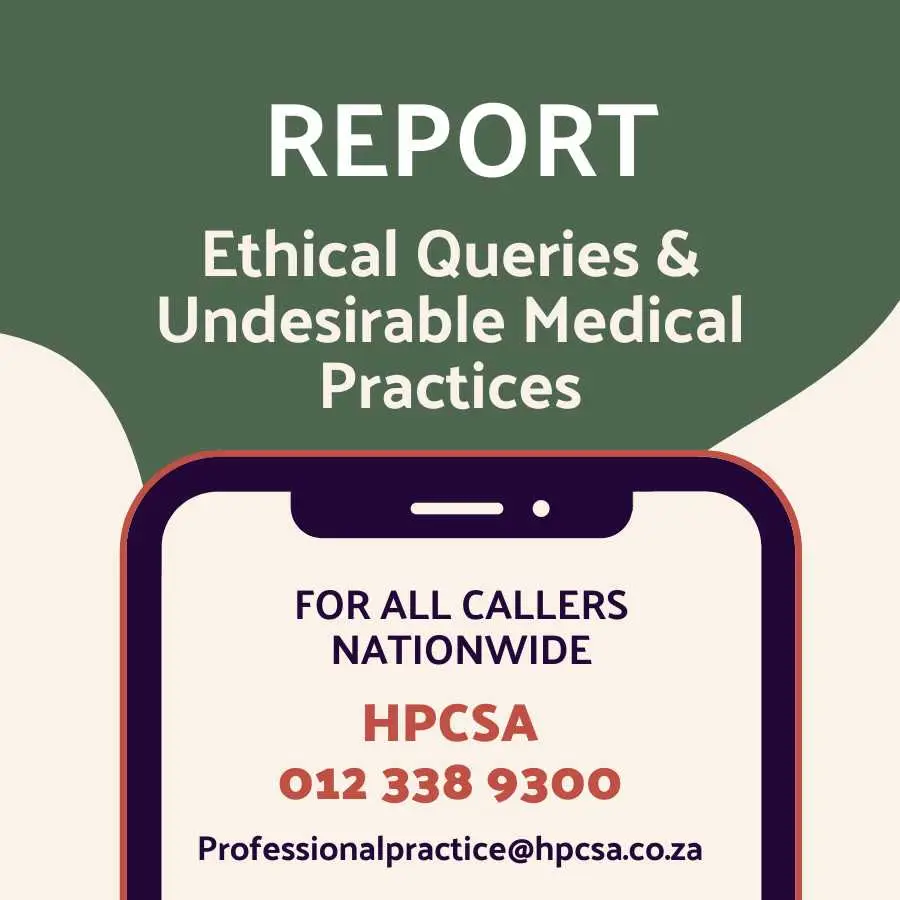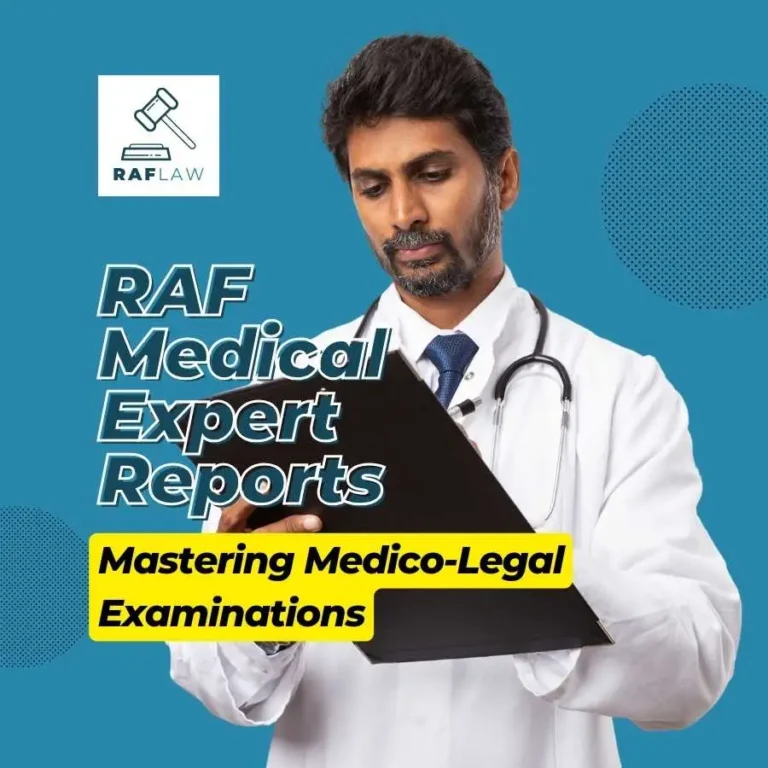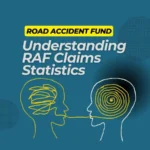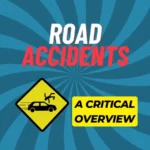Are you lost in the maze of Road Accident Fund (RAF) claims?
Navigating this path can be as daunting as recovering from the accident itself.
In this guide we shine a light on the crucial role of medical reports and the experts behind them.
Whether you’re a recent road accident victim or supporting someone through their claim. This article will help you with the complexities of medical examinations required. Which are an important step to achieve your goal of fair compensation.
The Crucial Role of Medical Reports in Road Accident Fund (RAF) Claims
Navigating the complexities of Road Accident Fund (RAF) claims can be a daunting task for many claimants. At the heart of these claims lies a critical component: medical reports.
These documents are more than just paperwork. They are the cornerstone of your claim.
Understanding these reports is not just about reading lines of text. Expert reports offer a detailed account of your injuries and their impact on your life.
They also help the reader comprehend the trajectory of your claim and the compensation you rightfully deserve.
In the world of RAF claims, medical reports serve as the bridge between your personal experience of the accident and the legal process that follows.
They translate your pain, suffering, and recovery into a language that the legal system can understand and act upon.
Remember, at the end of the day a judge will need to make an award. He or she wasn’t at the scene of the accident. They also cannot see inside your body to assess the injuries.
Instead, these reports provide a comprehensive view of your current and future medical needs. They ensure that your claim is not just about the accident but also about your journey to recovery and rehabilitation.

Structure of this Guide
This article is designed to unravel the complexities surrounding medical reports in RAF claims. We’ll take you through a journey of understanding. From the purpose of medico-legal examinations to the roles of various medical experts involved.
You’ll learn about the examination process, what to expect, and how to prepare yourself for these critical assessments.
We’ll delve into the differences between medical reports used in RAF claims and those you might receive from your regular doctor. This distinction is crucial in understanding how these reports are used in the context of your claim.
The logistics, the do’s and don’ts, and the ethical considerations. Every aspect will be covered to ensure you’re fully equipped with the knowledge you need.
We’ll also include case studies that illustrate the impact of these reports in actual RAF claims. This is to give you a real-world perspective.
In essence, this guide is your companion in demystifying medical reports in RAF claims. It’s tailored to be straightforward, engaging, and devoid of unnecessary jargon.
Our aim is to empower you with knowledge, making a complex process a bit more navigable.
Understanding Medico-Legal Examinations
Purpose and Significance in RAF Claims
Medico-legal examinations are a pivotal part of the Road Accident Fund (RAF) claims process. These examinations are not just routine medical check-ups. Instead, they are specialized evaluations designed to assess the full extent of injuries sustained in road accidents.
The purpose of these examinations is twofold. First, to provide an objective assessment of the claimant’s injuries. Second, to forecast the potential long-term impacts of these injuries.
This information is crucial in determining the appropriate compensation for the claimant.
The significance of these examinations cannot be overstated. They provide a concrete basis for the legal arguments in a claim. Without a thorough and accurate medical report, it becomes challenging to argue for fair compensation.
These reports offer a voice to the claimant’s suffering, transforming personal experiences into medically substantiated evidence.

Profiling the Medical Experts
The range of medical experts involved in RAF claims is diverse. This can be confusing. But each play a critical role in painting a comprehensive picture of the claimant’s injuries.
Here’s a brief overview:
- Orthopedic Surgeon: Focuses on injuries related to bones, joints, and muscles.
- Neurologist and Neurosurgeon: Assess neurological impacts, including brain injuries.
- Psychiatrist and Clinical Psychologist: Evaluate mental health impacts post-accident.
- Occupational Therapist and Industrial Psychologists: Determine the effect of injuries on the claimant’s ability to work and daily life.
- Radiologist: Provides imaging studies that offer internal views of injuries.
- Gynecologist, Pediatrician, and Child Psychologist: Specialize in injuries to women and children.
- Dentists and Maxillofacial Surgeons: Assess and report on dental and facial injuries.
- ENT Specialist and Ophthalmic Surgeon: Examine issues related to ears, nose, throat, and eyes.
- Urologist and Vascular Surgeon: Deal with injuries impacting the urinary system and blood vessels.
Each expert contributes their unique perspective. Together they ensure that all aspects of the claimant’s injuries are thoroughly evaluated.

Their assessments are not just about the current state but also about predicting future complications and needs. This is essential for a comprehensive RAF claim.
| Type of Medical Expert | Description and Relevance to Personal Injury Claims |
|---|---|
| Orthopedic Surgeon | Specializes in bone and muscle injuries. Crucial for assessing physical damage and long-term mobility issues resulting from accidents. |
| Neurologist | Evaluates nerve damage and brain injuries. Key for understanding the impact of head traumas and neurological disorders post-accident. |
| Psychiatrist | Addresses mental health issues arising from accidents, such as PTSD or depression, crucial for holistic injury assessment. |
| Occupational Therapist | Assesses the impact of injuries on daily activities and work capabilities, crucial for determining loss of function and required rehabilitation. |
| Radiologist | Provides imaging studies (X-rays, MRIs) to reveal internal injuries, essential for substantiating claims of internal trauma. |
| Plastic Surgeon | Addresses reconstructive needs following accidents, crucial for claims involving disfigurement or scarring. |
| Neurosurgeon | Specializes in brain and spinal cord injuries, critical for severe trauma cases requiring surgical intervention. |
| Industrial Psychologist | Evaluates the impact of injuries on work and psychological well-being, vital for claims involving career or employment disruption. |
| Gynecologist | Addresses injuries specific to female reproductive systems, important in accidents affecting women’s health. |
| Dentist | Assesses dental injuries, crucial for claims involving oral trauma. |
| Maxillo Facial and Oral Surgeon | Specializes in facial injuries, essential for claims involving jaw and facial reconstruction. |
| ENT Specialist | Evaluates ear, nose, and throat injuries, important for sensory loss or damage claims. |
| Clinical Psychologist | Assesses cognitive and emotional impacts, vital for understanding the psychological aftermath of an accident. |
| Speech Therapist | Addresses speech and communication impairments due to accidents, crucial for claims involving vocal or speech injuries. |
| Urologist | Assesses urinary system injuries, important for claims involving renal trauma. |
| Ophthalmic Surgeon | Evaluates eye injuries, critical for claims involving vision loss or eye trauma. |
| Neuropsychologist | Specializes in the relationship between brain injuries and behavior, important for comprehensive neurological assessments. |
| Vascular Surgeon | Focuses on blood vessel injuries, essential for claims involving circulatory system trauma. |
| Specialist Physician | Provides a comprehensive assessment of complex internal injuries, crucial for multi-faceted injury claims. |
| Pediatrician | Addresses injuries in children, important for claims involving minors with specific developmental considerations. |
| Child Psychologist | Focuses on the mental health of child accident victims, crucial for understanding the emotional impact on young victims. |
| Dermatologist | Evaluates skin injuries, important for claims involving burns or scarring. |
| Orthodontist | Specializes in dental alignment issues post-accident, crucial for claims involving dental corrective treatment. |
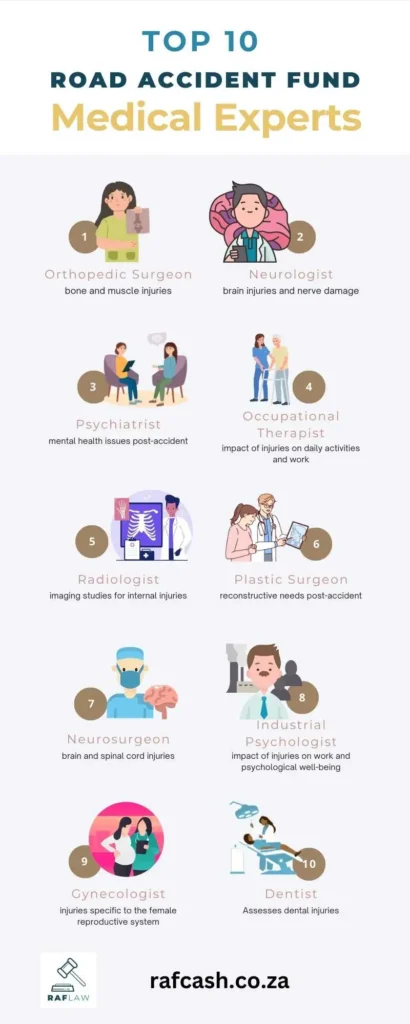
Medical Reports vs. Regular Medical Practice
Distinguishing Between Fact-Finding and Treatment
When it comes to Road Accident Fund (RAF) claims, the role of medical experts is significantly different from that of your regular healthcare provider. In a standard medical setting, the primary focus of a healthcare professional is to diagnose and treat patients. That is, to improve their health and well-being.
The relationship is therapeutic, centered on the patient’s immediate and long-term health needs.
In contrast, the medico-legal context of RAF claims requires a shift in focus. Here, medical experts are engaged in fact-finding. Their role is not to treat. Instead they are like detectives looking to assess and report on the claimant’s injuries as they relate to the accident.
This involves a thorough examination to document the nature and extent of the injuries. The purpose is to provide an objective, unbiased report that forms the foundation of the claimant’s case.
This fact-finding mission is vital in the realm of RAF claims. It ensures that compensation is based on the actual damages and losses incurred, rather than subjective assessments.
Medical reports in this context serve as a bridge between the medical condition of the claimant and the legal requirements of a claim. Medical experts translate physical and mental injuries into quantifiable data that can be used in the legal process.
The Ethical Oath and Patient Safety
Despite the differing objectives in medico-legal examinations, medical professionals remain bound by their ethical oath.
The principle of “do no harm” still applies. This ensures the safety and respect of the claimant during the examination. This ethical commitment is paramount. This is especially so in cases where claimants must undergo examinations of sensitive or invasive nature.
For instance, when a claimant is required to undress for an examination or discuss sensitive personal health issues, the medical expert’s ethical duty is to maintain a professional demeanor. This ensures the claimant’s comfort and dignity.

This adherence to ethical standards is crucial for maintaining trust in the medico-legal process.
It reassures claimants that, although the purpose of the examination is different, their rights and well-being are still a priority.
Medical professionals in this context are also bound by confidentiality.
The information gathered during these examinations is used solely for the purpose of the claim. It cannot disclosed for any other reason without the claimant’s consent.
This aspect of the ethical oath ensures that claimants’ privacy is respected, an essential factor in building a trustworthy medico-legal system.
In summary, while the focus of medico-legal examinations differs from regular medical practice, the commitment to ethical standards and patient safety remains a constant. Understanding this distinction helps claimants navigate the RAF claims process with confidence. Know that your well-being is still a top priority for the medical experts involved.
Report ethical queries and undesirable business practices to The Health Professions Council Of South Africa (HPCSA)
📞(+27) 12 338 9300/01
💻 http://www.hpcsaonline.custhelp.com
📫 553 Madiba Street, Madiba Street, Arcadia, 0083
📮 PO Box 205, Pretoria, 0001
The Examination Process
What to Expect in a RAF Medical Examination
When preparing for a Road Accident Fund (RAF) medical examination, understanding what to expect can significantly ease the process for claimants.
These examinations are thorough. They are designed to assess the full extent of injuries sustained in a road accident.
Typically, the examination will cover a comprehensive physical check-up, review of medical history, and a discussion about how the injuries have impacted your daily life.
Claimants should expect to provide detailed information about their accident and subsequent health issues. This includes describing pain levels, limitations in movement or activities, and any treatment received since the accident.
It’s important to be as detailed and accurate as possible, as this information directly influences the outcome of the claim.

The Role of Translators and Language Barriers
Effective communication is crucial in these examinations.
If a claimant is not comfortable or fluent in the language used by the medical professional, the use of a translator is essential. This is especially true in South Africa with our diverse population and 11 official languages (and some unofficial ones too).
This ensures accurate and clear communication. It is important you as a claimant you are able to fully convey the extent of their injuries and how they have been affected.
The presence of a translator also helps in understanding complex medical terms and procedures that might be discussed during the examination. It’s important that you understand these. You need to be comfortable with what is being communicated throughout the process.
Dual Examinations: Understanding Both Sides
In RAF claims, it’s common for both the claimant’s (your attorney) and the defendant’s (RAF) side to conduct their own medical examinations. This is known as dual examinations.
The reason for this is to provide a balanced view of the claimant’s injuries. While the claimant’s medical professional will focus on substantiating the claim, the defendant’s expert will assess the injuries to ensure the claims are justified.
This dual examination process ensures fairness and objectivity in the claim assessment.
Unfortunately this means you should be prepared to undergo examinations by both parties’ chosen medical professionals. You should approach each examination with the same level of seriousness and honesty.
Repetition of Examinations: Reasons and Consequences
Sometimes, claimants may be required to undergo repeated examinations. This could be due to various reasons such as a need for updated information, a change in the claimant’s condition, or for further clarification of specific injuries.
Repeated examinations might seem burdensome. However, they are crucial for maintaining the accuracy and relevance of the medical report. These repeated assessments ensure that the claim reflects the current state of the claimant’s injuries. They can also significantly impact the final compensation amount.

Preparing for Your Examination
Navigating Logistics: Transportation and Travel
Preparing for a Road Accident Fund (RAF) medical examination often involves more than just mental readiness. Logistics play a crucial role too. For claimants, especially those residing outside of major cities, arranging transportation can be a significant concern.
It’s essential to plan your travel well in advance to ensure timely arrival. If transportation is a challenge, reach out to your attorney or claim representative who may be able to assist with arranging transport or suggest viable alternatives.
Remember, missing or being late for a medical examination can delay your claim process or affect the outcome.
Do’s and Don’ts For Your Defence Medical Examination
When attending a defence medical examination, it’s vital to understand the dos and don’ts to ensure the process goes smoothly.
- Do:
- Arrive on time and well-prepared.
- Be honest and detailed when describing your injuries and how they impact your life.
- Follow all instructions given by the medical professional during the examination.
- Don’t:
- Exaggerate or downplay your symptoms.
- Withhold any relevant information about your medical history or the accident.
- Discuss the legal or financial aspects of your case during the examination.
These guidelines are designed to help claimants navigate the examination process transparently and effectively. Ensure that the resulting medical report is an accurate representation of your condition.

Ethical Considerations and Authenticity
Ethical considerations are at the forefront of preparing for your RAF medical examination. It’s critical to approach the examination with honesty and integrity.
Presenting your injuries and their effects on your life authentically is crucial. Misrepresentation not only undermines your credibility but can also have legal consequences.
Here are 2 case studies to make this point more real.
Case Study 1: Exaggeration of Injuries
Kagiso Victor Thulare, a 30-year-old office worker, was involved in a car accident which resulted in minor whiplash and a fractured wrist.
During his RAF medical examination, Kagiso overstated his limitations, claiming he was unable to return to any form of work. However, surveillance footage later showed John actively involved in a physical hobby, contradicting his claims.
This led to his credibility being questioned.
As a result, the RAF significantly reduced his compensation, leaving him with insufficient funds to cover even his actual medical expenses.
Case Study 2: Concealment of Pre-existing Conditions
Zanele Mokoena, a 45-year-old professional dancer. She sustained a knee injury from a road incident.
During her medical examination she failed to disclose a previous knee condition which could have explained her current symptoms.
The medical examination revealed the old injury through advanced imaging tests.
This nondisclosure led to allegations of fraudulent claims, causing the RAF to deny her compensation entirely.
Jane’s omission not only resulted in a loss of potential benefits but also legal repercussions for insurance fraud.
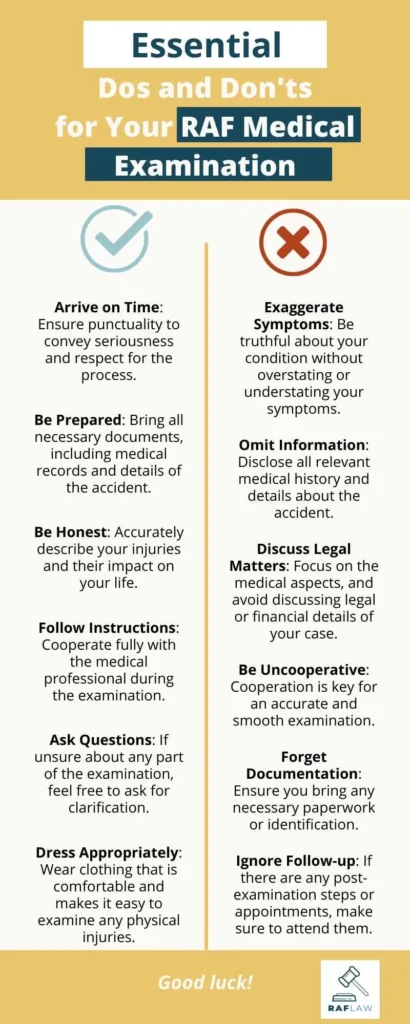
Scope of Services by Medico-Legal Experts
Comprehensive Overview of Services Offered
Medico-legal experts play a vital role in the Road Accident Fund (RAF) claims process. These professionals offer a range of services that are essential for accurately assessing and documenting the impacts of road accidents on victims.
However, their expertise is not limited to the physical examination of injuries. It encompasses a broad spectrum of services designed to provide a holistic view of the claimant’s situation, both physically and psychologically.
The scope of these services is wide-ranging, designed to cover every aspect of the claimant’s experience post-accident. Many of these critical services may be provided to your attorney without you even being aware.
This comprehensive approach ensures that all factors – medical, psychological, and practical – are taken into consideration when compiling the medico-legal report.
These reports are pivotal in determining the outcome of RAF claims. They provide the factual basis upon which claims are evaluated and compensations are determined.
Specific Services Explained
| Service | Description |
|---|---|
| Assessment of Medical Records | This involves reviewing all existing medical documentation related to the claimant’s injuries. It’s crucial for understanding the medical history and the progression of the claimant’s condition post-accident. |
| Consultation and Examination of Patients | A thorough physical and psychological examination of the claimant to assess the current state of injuries and their impact on the claimant’s life. |
| Collection of Collateral Information | Gathering additional information from other sources, such as family members or employers, to provide a more comprehensive view of the claimant’s situation. |
| Compiling Medico-Legal Reports | Creating detailed reports that summarize findings from examinations and assessments, crucial for legal proceedings. |
| Testifying in Court | Providing expert testimony based on the medico-legal report, which can be pivotal in the outcome of the claim. |
| Preparing Joint Minutes | Collaborating with other medical experts to prepare joint reports, especially in cases where multiple experts are involved. |
| Radiological Examinations and Reports | Conducting and interpreting X-rays, MRIs, and other imaging studies to provide a clearer picture of the internal injuries. |
| Psychometric Assessments | Evaluating the psychological impact of the accident, including cognitive and emotional assessments. |
| Pathology Examinations and Reports | Analyzing tissue samples, if necessary, to understand the nature and extent of injuries. |
| RAF 4 Serious Injury Assessments | Conducting specific assessments to determine if injuries meet the criteria for a ‘serious injury’ as defined by the RAF. |
| Completion of Statutory Medical Reports | Filling out required legal forms and reports as part of the RAF claim process. |
Each of these services is integral to building a strong, fact-based claim.
They ensure that every aspect of the claimant’s post-accident experience is documented and considered in the legal process. Thereby aiding in achieving a fair and just outcome in RAF claims.
Role of the South African Institute of Medicolegal Experts
Setting Standards and Practices
The South African Institute of Medicolegal Experts (SAIME) plays a crucial role in the landscape of medicolegal practice in South Africa. Particularly in relation to Road Accident Fund (RAF) claims.
This institution is pivotal in setting the standards and practices for medicolegal experts. This ensures that they deliver services of the highest quality and integrity.
SAIME’s role in establishing standards extends to various aspects of medicolegal practice.
This includes guidelines on how to conduct thorough and unbiased medical examinations, how to compile comprehensive and accurate medico-legal reports, and the ethical considerations that must guide all interactions with claimants.
These standards are crucial for maintaining the professionalism and credibility of medicolegal experts. As well as ensuring that claimants receive fair and just treatment throughout the claims process.
The institute also plays a key role in advancing the field of medicolegal expertise through ongoing education and training. By staying abreast of the latest developments in both medicine and law, SAIME ensures that its members are well-equipped to handle the complexities of RAF claims.
This serves you by knowing that the experts representing your case are upholding the highest standards of practice.
Accreditation and Its Importance
Accreditation by SAIME serves as a hallmark of quality and expertise in the field of medicolegal practice.
For medical professionals, obtaining accreditation from this esteemed institution signifies a level of competence and commitment to ethical practice. This is recognized and respected throughout South Africa.
For claimants in RAF cases, choosing a SAIME-accredited expert provides an added layer of assurance.
It means that the medical expert handling their case adheres to the highest standards of professional conduct and is equipped with the necessary skills and knowledge to provide accurate and reliable assessments.
This accreditation is particularly important in the context of road accident claims, where the quality and integrity of medical reports can have a profound impact on the outcome of a claim.
Speak to your attorney about which doctors and medical experts they will be using and their qualifications. This ensures that medicolegal experts uphold the values of fairness, accuracy, and ethical practice. Values that are indispensable in the pursuit of justice for road accident victims.
Relevant Case Studies
Real-Life Examples and Outcomes
Case studies in the context of Road Accident Fund (RAF) claims offer invaluable insights into the complexities and nuances of the claims process.
These real-life examples illustrate the significant role that medical experts and accurate reporting play in determining the outcomes of these cases.
Case Study 1: The Importance of Detailed Medical Reporting
- Background: A claimant sustained multiple injuries in a road accident, including a traumatic brain injury.
- Challenge: Initially, the claimant’s injuries were underestimated, affecting the compensation offered.
- Resolution: A comprehensive medical examination by a neurologist provided a detailed report, highlighting the long-term impact of the brain injury. This led to a revised claim that accurately reflected the severity of the injuries.
- Outcome: The claimant received adequate compensation, ensuring support for long-term medical care and rehabilitation.

Case Study 2: Overcoming Language Barriers in Medical Examinations
- Background: A non-English speaking claimant faced difficulties in communicating the extent of their injuries.
- Challenge: The initial medical report failed to capture the full impact of the injuries due to language barriers.
- Resolution: With the assistance of a translator, a second examination was conducted, allowing the claimant to accurately describe their injuries and their effect on daily life.
- Outcome: The revised medical report led to a fairer assessment of the claim, resulting in a more appropriate compensation package.
Case Study 3: Ethical Dilemmas in Reporting
- Background: A claimant was advised to exaggerate symptoms to increase the claim value.
- Challenge: This unethical advice threatened to undermine the integrity of the claim.
- Resolution: The claimant chose to be honest in the medical examination, and the medical expert’s report accurately reflected the true extent of the injuries.
- Outcome: The claim was successfully resolved, with the claimant receiving compensation that was just and reflective of the actual injuries sustained.
These case studies demonstrate the critical importance of accurate and ethical practices in the medico-legal field.
They highlight how comprehensive medical assessments, effective communication, and adherence to ethical standards can significantly influence the outcomes of RAF claims.
The end result? Justice and fairness for those affected by road accidents.
Wrapping Up
Summary of Key Insights
The journey through the Road Accident Fund (RAF) claims process is complex and multifaceted. It involves various stages and participants.
From understanding the critical role of medical reports in RAF claims to navigating the examination process, each step is vital in ensuring a fair and just outcome for claimants.
Key insights from this guide include:
- The Importance of Medico-Legal Examinations: These are not just routine check-ups but are critical assessments that form the backbone of your RAF claim.
- Role of Medical Experts: Various medical professionals play specific roles, each contributing essential insights into the nature and impact of your injuries.
- Understanding the Examination Process: Knowing what to expect, including the role of translators and the significance of dual examinations, can demystify the experience and reduce anxiety.
- Preparation is Key: Proper preparation, from logistics to understanding the do’s and don’ts, is crucial for a smooth examination process.
- Ethical Considerations: The ethical responsibilities of medical professionals and claimants alike are fundamental to the integrity of the claims process.
Encouraging Professional Guidance
Navigating the RAF claims process can be challenging, and professional guidance can be invaluable.
Engaging with knowledgeable attorneys and accredited medico-legal experts can significantly ease this journey. These professionals can provide not just legal advice but also emotional support, guiding you through each step with expertise and empathy.
Remember, the aim of the RAF claims process is to ensure that you receive fair compensation for the injuries and losses sustained. Relying on the expertise of professionals who understand the intricacies of the system can make a substantial difference in achieving a positive outcome.
The path to a successful RAF claim can be complex. However, understanding the process, preparing adequately, and seeking professional assistance can lead to a more navigable and less stressful experience.
Your journey to justice and fair compensation is important. With the right guidance and knowledge, it can be a journey marked by integrity and success.
Stay Informed
Now that you’re equipped with essential insights into the RAF claims process, it’s time to take the next step.
Don’t navigate this journey alone.
RAF Fact is here to guide you through the intricate process of your claim. RAF Fact is your ally in navigating the road to justice
Take action today for a smoother, more informed path to your RAF claim resolution. Join our RAF Fact newsletter today for free.
Frequently Asked Questions
What is the role of medical reports in RAF claims?
Medical reports provide detailed documentation of your injuries, crucial for substantiating your claim and determining compensation.
Who are the medical experts involved in RAF claims?
Medical experts include orthopedic surgeons, neurologists, psychiatrists, and more, each assessing specific aspects of your injuries.
What should I expect during a RAF medical examination?
Expect a detailed assessment of your injuries, questions about your accident, and discussions about the impact on your daily life.
Why might I need a translator during my medical examination?
A translator ensures effective communication, especially if there’s a language barrier between you and the medical professional.
What is the purpose of dual examinations in RAF claims?
Dual examinations by both claimant’s and defendant’s medical experts ensure a balanced and fair assessment of your injuries.
Why are medical examinations sometimes repeated?
Repeat examinations may be needed for updated information, changes in your condition, or to clarify specific injuries.
What are the do's and don'ts for a RAF medical examination?
Do be honest and detailed; don’t exaggerate symptoms or omit information. Be cooperative and arrive prepared.
How do ethical considerations affect my RAF claim?
Ethical considerations ensure your rights and dignity are respected during examinations and that your claim is handled fairly.
What is the importance of accreditation from the South African Institute of Medicolegal Experts?
Accreditation signifies a medicolegal expert’s commitment to ethical practice and high professional standards.
How can RAF FACT assist me in my claim process?
RAF FACT offers expert advice, support, and comprehensive services to guide you through your RAF claim for a fair outcome.
Report Ethical Queries and Undesirable Medical Practices
